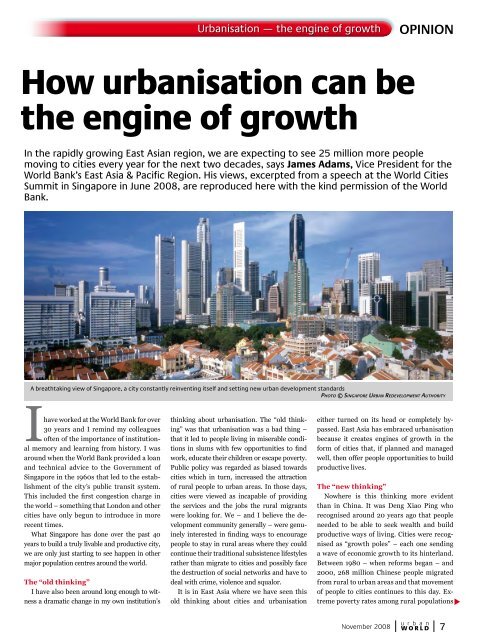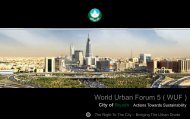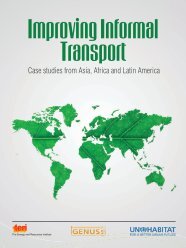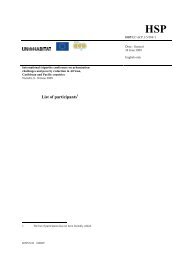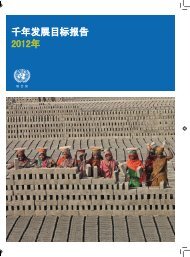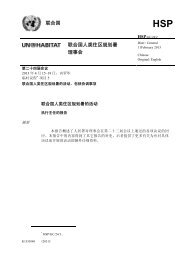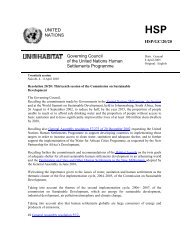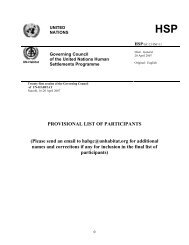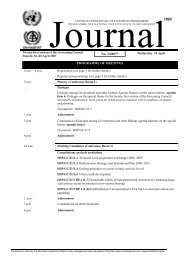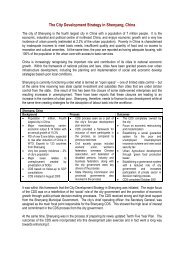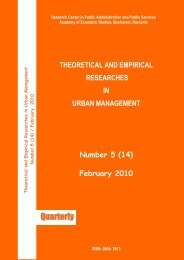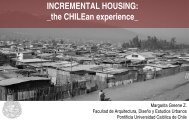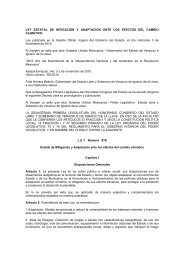Harmonious cities - UN-Habitat
Harmonious cities - UN-Habitat
Harmonious cities - UN-Habitat
You also want an ePaper? Increase the reach of your titles
YUMPU automatically turns print PDFs into web optimized ePapers that Google loves.
Urbanisation — the engine of growth<br />
How urbanisation can be<br />
the engine of growth<br />
I have worked at the World Bank for over<br />
30 years and I remind my colleagues<br />
often of the importance of institutional<br />
memory and learning from history. I was<br />
around when the World Bank provided a loan<br />
and technical advice to the Government of<br />
Singapore in the 1960s that led to the establishment<br />
of the city’s public transit system.<br />
This included the first congestion charge in<br />
the world – something that London and other<br />
<strong>cities</strong> have only begun to introduce in more<br />
recent times.<br />
What Singapore has done over the past 40<br />
years to build a truly livable and productive city,<br />
we are only just starting to see happen in other<br />
major population centres around the world.<br />
The “old thinking”<br />
I have also been around long enough to witness<br />
a dramatic change in my own institution’s<br />
thinking about urbanisation. The “old thinking”<br />
was that urbanisation was a bad thing –<br />
that it led to people living in miserable conditions<br />
in slums with few opportunities to find<br />
work, educate their children or escape poverty.<br />
Public policy was regarded as biased towards<br />
<strong>cities</strong> which in turn, increased the attraction<br />
of rural people to urban areas. In those days,<br />
<strong>cities</strong> were viewed as incapable of providing<br />
the services and the jobs the rural migrants<br />
were looking for. We – and I believe the development<br />
community generally – were genuinely<br />
interested in finding ways to encourage<br />
people to stay in rural areas where they could<br />
continue their traditional subsistence lifestyles<br />
rather than migrate to <strong>cities</strong> and possibly face<br />
the destruction of social networks and have to<br />
deal with crime, violence and squalor.<br />
It is in East Asia where we have seen this<br />
old thinking about <strong>cities</strong> and urbanisation<br />
November 2008<br />
OPINION<br />
In the rapidly growing East Asian region, we are expecting to see 25 million more people<br />
moving to <strong>cities</strong> every year for the next two decades, says James Adams, Vice President for the<br />
World Bank’s East Asia & Pacific Region. His views, excerpted from a speech at the World Cities<br />
Summit in Singapore in June 2008, are reproduced here with the kind permission of the World<br />
Bank.<br />
A breathtaking view of Singapore, a city constantly reinventing itself and setting new urban development standards<br />
Ph o t o © Si n g A P o r e ur B A n red e v elo P m en t Aut h o r i t y<br />
either turned on its head or completely bypassed.<br />
East Asia has embraced urbanisation<br />
because it creates engines of growth in the<br />
form of <strong>cities</strong> that, if planned and managed<br />
well, then offer people opportunities to build<br />
productive lives.<br />
The “new thinking”<br />
Nowhere is this thinking more evident<br />
than in China. It was Deng Xiao Ping who<br />
recognised around 20 years ago that people<br />
needed to be able to seek wealth and build<br />
productive ways of living. Cities were recognised<br />
as “growth poles” – each one sending<br />
a wave of economic growth to its hinterland.<br />
Between 1980 – when reforms began – and<br />
2000, 268 million Chinese people migrated<br />
from rural to urban areas and that movement<br />
of people to <strong>cities</strong> continues to this day. Extreme<br />
poverty rates among rural populations<br />
u r b a n<br />
WORLD 7


